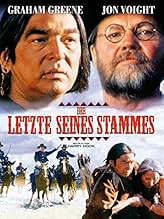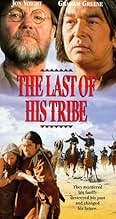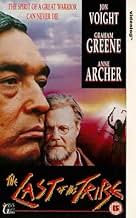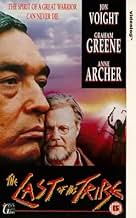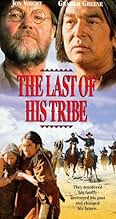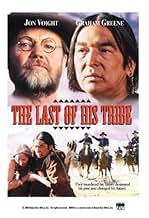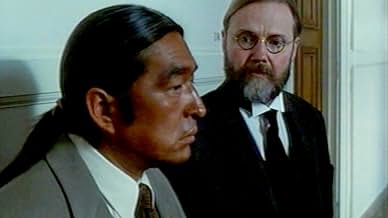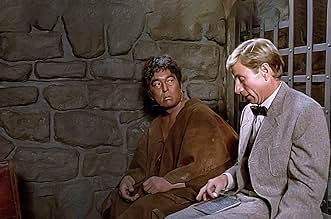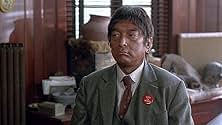Ishi, the last Yahi Indian of California, must leave his homeland and learn to navigate the world of the white man in order to survive.Ishi, the last Yahi Indian of California, must leave his homeland and learn to navigate the world of the white man in order to survive.Ishi, the last Yahi Indian of California, must leave his homeland and learn to navigate the world of the white man in order to survive.
- Awards
- 2 wins & 3 nominations total
Charles Martinet
- Assistant Museum Director
- (as Charles A. Martinet)
Benne Alder
- Mrs. Whatley
- (as Benne B. Adler)
- Director
- Writer
- All cast & crew
- Production, box office & more at IMDbPro
Featured reviews
I believe that having read a book that becomes a movie, tends to bias the reviewer into more of a comparison rather than a film review. I came into "The Last of His Tribe" with zero knowledge of the story. Based on fact,I find it forgivable for a film to embellish for entertainment purposes, unless it is presented as an outright documentary. The acting is strong, with Graham Greene outstanding in a quiet, understated, performance as Ishi the last survivor of his tribe. John Voight is the scientist who intends to take advantage of a marvelous opportunity, for learning the secrets of Ishi's people. David Ogden Stiers is a sensitive physician, who views Ishi not as an object for study, but simply as a man. So what if it's not totally accurate? "The Last of His Tribe" is a fine movie, with sensitive performances. - MERK
I believed Graham Greene did well portraying Ishi since he easily blended in with the character's storyline. I found it interesting how the anthropologist he befriended became so familiar with his Native language so soon! I think he wasn't like any other white anthropologist who wasn't interested in truly getting to know the people whose cultures he was studying. He really had a genuine liking for Ishi and as a result their friendship became very deep.
Well........ anyways........... that's the reason why I gave this film a 6 out of 10.
Well........ anyways........... that's the reason why I gave this film a 6 out of 10.
This well above average telemovie gives us a unique glance into a slice of American history that was never given enough attention (I'd say for rather obvious but unforgivable reasons) The amazing story of Ishi, the last of the Yahl tribe members, is as curious as it is tragic. Ishi (Man) is well played by Graham Greene a native performer I've always enjoyed on screen - in fact I would have been happier if he had made more appearances. As Ishi's protector and mentor John Voight gives an award winning turn as Professor of Anthropology at Uni of California, Alfred Kroeber. Kroeber excelled in languages and studied many Native languages and according to this treatment, even knew many key-words in Yahl tongue. In Ishi, Kroeber recognised a firsthand study of these otherwise extinct people - providing precious insights into customs, lifestyle and language for the Museum. This solid screenplay by Award-winning writer Stephen Harrigan is based on a bestselling book by Kroeber's second wife Theodore, who sadly never met Ishi. The film begins while the Prof is married to first wife, Henriette (played by lovely Anne Archer) who is dying of consumption. Ishi is brought to the professor to uncover insights into how this extremely rare man had survived hiding in mountainous country for several decades!
Sensitively directed by Harry Hook it's a film for thinking audiences and an unexpected find from the HBO stables - although one or two slightly 'suss' scenes look as if they may have been added, at possible request, by HBO to 'spice' up an otherwise near documentary study. High production values keep the movie visually impressive and help us gain an understanding of the terrible waste of life at the hands of greed and ignorance. The deliberately slow pace gives the viewer time to absorb the beauty of the landscapes and the gradual interchange between these vastly different cultures.
Award-winning British composer John. E. Keane captures the wide vistas and emotional bond between Ishi and his Museum protectors. Because little has been recorded from these times - much of Ishi's earlier existence is built on supposition, and while this may be somewhat obvious, it's so sincerely achieved its all quite convincing. One of the saddest outcomes of this cross-culture union is that Ishi died without anyone being able to find out his real name - this somehow seems so odd. While not run as often as it deserves, it's well worth finding on DVD - could also be a good resource for school studies.
Sensitively directed by Harry Hook it's a film for thinking audiences and an unexpected find from the HBO stables - although one or two slightly 'suss' scenes look as if they may have been added, at possible request, by HBO to 'spice' up an otherwise near documentary study. High production values keep the movie visually impressive and help us gain an understanding of the terrible waste of life at the hands of greed and ignorance. The deliberately slow pace gives the viewer time to absorb the beauty of the landscapes and the gradual interchange between these vastly different cultures.
Award-winning British composer John. E. Keane captures the wide vistas and emotional bond between Ishi and his Museum protectors. Because little has been recorded from these times - much of Ishi's earlier existence is built on supposition, and while this may be somewhat obvious, it's so sincerely achieved its all quite convincing. One of the saddest outcomes of this cross-culture union is that Ishi died without anyone being able to find out his real name - this somehow seems so odd. While not run as often as it deserves, it's well worth finding on DVD - could also be a good resource for school studies.
I usually try to avoid overstating my case, but this is probably the worst film ever made. The true story of Ishi is a story of a life well lived and a sensitive ambassador of one culture to another. But this film is so full of falsehoods about Ishi, and clichés about Native Americans, that it should probably be banned. And I have never said that before about any work of art or literature.
Until his encounter with the Saltu (us), Ishi was merely a good citizen (so to speak) of his harassed and harried nation, simply doing what he was supposed and expected to do as a Yana man. Period. After that encounter, he took up his destiny as a bridge between two utterly different cultures and fulfilled it with dignity and competence. He did NOT at any time freak out and run around shouting "No! No!"---what baloney! Almost everyone who knew him commented on the low-keyed, self-controlled manner in which he conducted himself in his strange surroundings. He never lost his cool. Nor did he babble ridiculous Hollywood-Indian clichés about "our Mother Earth", etc., as appears in the film. The most insulting lie in the film is the sequence in which Pope (who was, by the way, certainly not the clownish idiot portrayed here) brings in a prostitute to service Ishi. Actually, Ishi had much too great a sense of dignity to indulge in any such thing, and was always very cool and formal in the presence of women, as his culture demanded.
The portrayal of Kroeber is almost as offensive. The film makes him into a stereotype of the emotionally starved anthropologist who regards Indians coldly as mere objects of study, and allows him to really respect Ishi only after the latter is dead. Again, nonsense. Kroeber did use the kind of language that was common in his day: he wrote that when Ishi made his first acquaintance with Saltu society "he was absolutely ignorant" (of Saltu ways, that is), and used unfortunate expressions like "wild Indian." But everybody knew what he meant. He and Ishi were friends, and Kroeber made it clear that knowing Ishi was one of the great experiences of his life---Ishi, he made clear, not as an object of study but as a warm, generous and gracious human being. There is no evidence that Kroeber's wife Henrietta looked down her nose at Ishi or that she was the racist snob depicted in the film. In fact, as Kroeber's second wife Theodora recorded in her memoirs, Ishi's sensitivity and compassion helped Kroeber greatly in dealing with Henrietta's death. I guess the makers of this film avoided depicting that because it would have interfered with their disorted portrayal of Kroeber as an insensitive lout. (Speaking of Theodora, she wrote two very readable and informative accounts of the life of Ishi, whom she had never met, consulting extensively with her husband. And by the way, these two were the parents of the fantasy writer Ursula K. LeGuinn.)
If only this film had been based on Theodora's writing! This film, I say again, is an atrocity. It makes me so angry that I feel like committing mayhem.
Until his encounter with the Saltu (us), Ishi was merely a good citizen (so to speak) of his harassed and harried nation, simply doing what he was supposed and expected to do as a Yana man. Period. After that encounter, he took up his destiny as a bridge between two utterly different cultures and fulfilled it with dignity and competence. He did NOT at any time freak out and run around shouting "No! No!"---what baloney! Almost everyone who knew him commented on the low-keyed, self-controlled manner in which he conducted himself in his strange surroundings. He never lost his cool. Nor did he babble ridiculous Hollywood-Indian clichés about "our Mother Earth", etc., as appears in the film. The most insulting lie in the film is the sequence in which Pope (who was, by the way, certainly not the clownish idiot portrayed here) brings in a prostitute to service Ishi. Actually, Ishi had much too great a sense of dignity to indulge in any such thing, and was always very cool and formal in the presence of women, as his culture demanded.
The portrayal of Kroeber is almost as offensive. The film makes him into a stereotype of the emotionally starved anthropologist who regards Indians coldly as mere objects of study, and allows him to really respect Ishi only after the latter is dead. Again, nonsense. Kroeber did use the kind of language that was common in his day: he wrote that when Ishi made his first acquaintance with Saltu society "he was absolutely ignorant" (of Saltu ways, that is), and used unfortunate expressions like "wild Indian." But everybody knew what he meant. He and Ishi were friends, and Kroeber made it clear that knowing Ishi was one of the great experiences of his life---Ishi, he made clear, not as an object of study but as a warm, generous and gracious human being. There is no evidence that Kroeber's wife Henrietta looked down her nose at Ishi or that she was the racist snob depicted in the film. In fact, as Kroeber's second wife Theodora recorded in her memoirs, Ishi's sensitivity and compassion helped Kroeber greatly in dealing with Henrietta's death. I guess the makers of this film avoided depicting that because it would have interfered with their disorted portrayal of Kroeber as an insensitive lout. (Speaking of Theodora, she wrote two very readable and informative accounts of the life of Ishi, whom she had never met, consulting extensively with her husband. And by the way, these two were the parents of the fantasy writer Ursula K. LeGuinn.)
If only this film had been based on Theodora's writing! This film, I say again, is an atrocity. It makes me so angry that I feel like committing mayhem.
This is a true story. It is more emotional than a soap opera and, yet, unflinchingly genuine.
Just as was depicted in this film, Ishii stumbled into a white man's barn near Oroville, California, in 1911. He later told Kroeber that he expected nothing but death. Graham Greene's portrayal of a soft-spoken primitive gentleman is delightful. Greene's Ishii speaks English only after a fashion.
If you have the time, look up Kroeber's story of Ishii in the "Handbook of California Indians".
Just as was depicted in this film, Ishii stumbled into a white man's barn near Oroville, California, in 1911. He later told Kroeber that he expected nothing but death. Graham Greene's portrayal of a soft-spoken primitive gentleman is delightful. Greene's Ishii speaks English only after a fashion.
If you have the time, look up Kroeber's story of Ishii in the "Handbook of California Indians".
Did you know
- TriviaA TV movie for the HBO network.
- ConnectionsFeatured in The 50th Annual Golden Globe Awards (1993)
Details
- Runtime
- 1h 31m(91 min)
- Color
- Aspect ratio
- 1.85 : 1
Contribute to this page
Suggest an edit or add missing content

